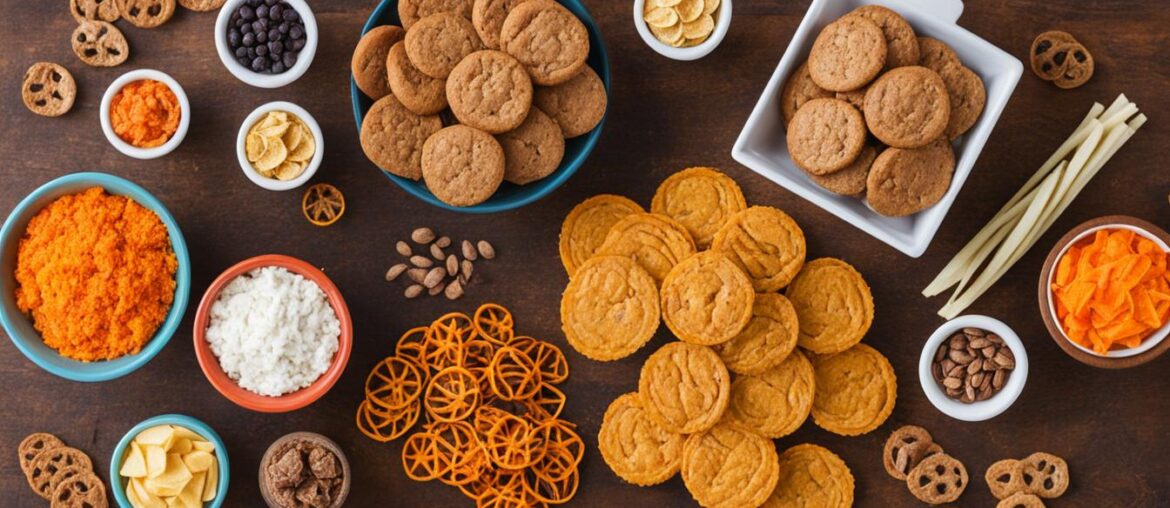As pet owners, we often find ourselves wondering if certain human foods are safe for our furry friends. One common question that arises is whether dogs can safely consume rye bread. Today, I will delve into this topic and provide valuable insights from veterinarians to help you make informed decisions about feeding rye bread to your canine companions.
When it comes to dogs and rye bread, it’s essential to consider their dietary needs and potential risks associated with this type of bread. While rye bread is not inherently toxic to dogs, it may not be the healthiest option due to its lack of essential nutrients and high sugar content. However, the key lies in moderation and being mindful of the ingredients in the bread you choose.
Before we explore further, let’s highlight a few key takeaways:
Key Takeaways:
- While rye bread is not toxic to dogs, it is not the healthiest snack for them due to its lack of nutrients and high sugar content.
- Feeding dogs rye bread in moderation is generally safe, but excessive consumption can lead to digestive issues and potential liver damage.
- It is crucial to read ingredient labels and choose rye bread varieties that do not contain harmful ingredients like onions or garlic.
- Other bread options, such as plain white bread and whole wheat bread, may be safer and healthier choices for dogs.
- Always consult with a veterinarian before introducing any new food into your dog’s diet.
Now, let’s explore in more detail the reasons behind the considerations and risks associated with feeding dogs rye bread, as well as other bread options that can be safer and more suitable for our four-legged companions.
Can Dogs Eat Bread? Understanding Dietary Considerations for Canines
While dogs can safely eat bread, it should be given in moderation and as a treat rather than a staple in their diet. Rye bread, specifically, has limited nutritional value for dogs and should not make up a significant portion of their diet. It is important to consider the overall nutritional needs of dogs and provide them with balanced and complete meals that incorporate other wholesome ingredients.
When it comes to canine diet and rye bread, it is essential to understand that dogs are primarily carnivores and have specific dietary requirements. Bread, including rye bread, is not a natural part of their diet and should be viewed as an occasional indulgence.
While bread can provide dogs with some carbohydrates and fiber, it is generally not a significant source of essential nutrients. Rye bread, in particular, contains minimal protein and lacks the necessary vitamins and minerals that dogs need for optimal health.
Instead of relying on bread as a source of nutrition, it is recommended to focus on providing dogs with a well-rounded diet that includes high-quality meats, fruits, vegetables, and grains specifically formulated for their dietary needs.
Bread Alternatives for Dogs
If you’re looking for alternative options to incorporate into your dog’s diet, there are several healthy choices:
- Plain white bread: A basic white bread without any added ingredients is safe for dogs to consume in moderation. It should be a small part of their overall diet.
- Whole wheat bread: Whole wheat bread provides more fiber than white bread and can be a slightly healthier option for dogs. However, it should still be given sparingly.
- Bread without added ingredients: Opt for bread that does not contain seeds, garlic, raisins, or other harmful ingredients. Plain bread is generally a safer choice for dogs.
Remember, when introducing any new food into your dog’s diet, it is important to do so gradually and monitor their response. Not all dogs tolerate bread well, and some may experience digestive issues when consuming it.
By understanding the dietary considerations for canines and selecting appropriate bread alternatives, you can ensure that your furry friend receives a balanced and nutritious diet while still being able to enjoy the occasional treat.
The Risks of Feeding Dogs Rye Bread
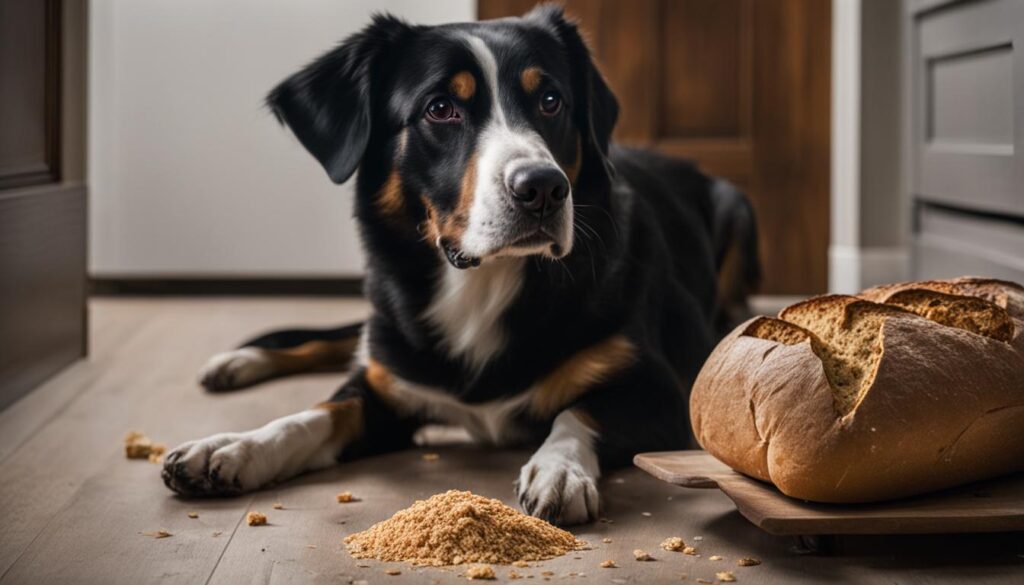
Feeding dogs rye bread can pose certain risks. Rye bread often contains ingredients that are potentially harmful to dogs, such as onions or garlic. Additionally, some dogs may have allergies or sensitivities to gluten, which is present in rye bread. It is crucial to carefully read ingredient labels and avoid giving dogs any bread varieties that contain harmful ingredients or that they may be allergic to.
Ingredients to Avoid in Rye Bread for Dogs
| Ingredients | Potential Risks |
|---|---|
| Onions | Possible toxicity and anemia |
| Garlic | Possible toxicity, can damage red blood cells |
| Gluten | Allergic reactions, digestive issues in sensitive dogs |
When it comes to feeding your dog rye bread, it’s important to prioritize their health and well-being. Avoiding rye bread varieties that contain harmful ingredients, such as onions or garlic, can help prevent potential health problems. Additionally, be mindful of your dog’s individual sensitivities and allergies, especially to gluten. Opt for bread varieties that are specifically formulated for dogs or stick to safe alternatives that provide better nutritional value.
Can Dogs Eat Other Types of Bread?
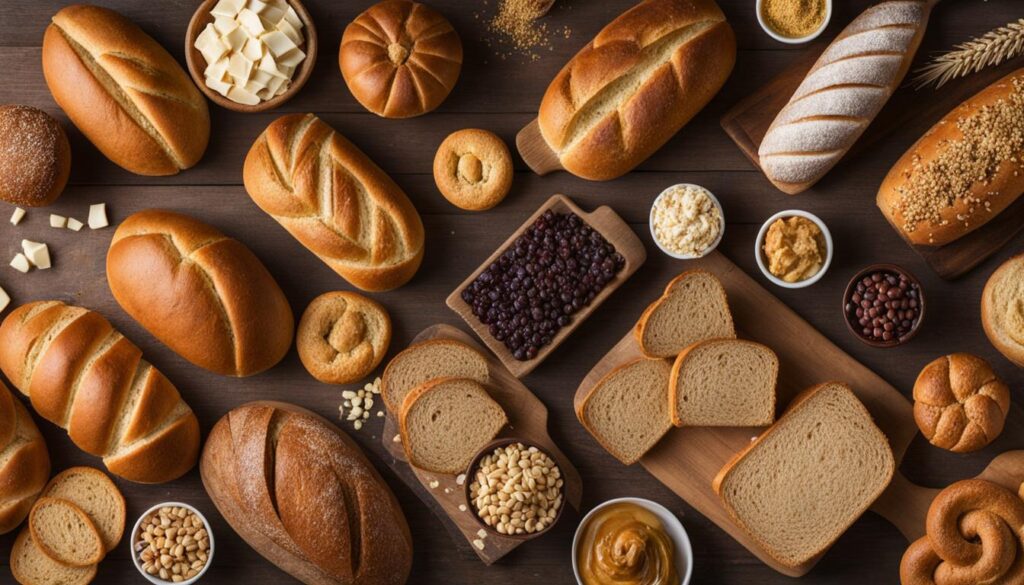
Dogs can safely enjoy a variety of bread types, although it is essential to select options that are both healthy and safe for them. When choosing bread for your furry friend, consider these dog-friendly options:
- Plain white bread: Simple and free from added ingredients, plain white bread can be a safe choice for dogs when consumed in moderation.
- Whole wheat bread: Packed with fiber and essential nutrients, whole wheat bread can be a healthier alternative to white bread for dogs.
- Bread without added ingredients: Opt for bread that doesn’t contain any potentially harmful additives such as seeds, garlic, or raisins. These ingredients can be toxic to dogs and should be avoided.
Feeding bread to dogs should be a treat and not a significant part of their diet. Remember to provide bread in moderation to prevent any potential digestive upset. It’s important to prioritize a balanced and complete diet for dogs that incorporates other wholesome ingredients to meet their nutritional needs.
Benefits of Dog-Friendly Bread Options
- Plain white bread can be a convenient way to deliver medication to a dog that is not keen on taking pills.
- Whole wheat bread provides additional fiber, which can support digestive health in dogs.
- Choosing bread without added ingredients ensures that dogs avoid potentially harmful substances and allergens.
Remember, always consult your veterinarian before making any significant changes to your dog’s diet or introducing new foods, including bread. They can provide personalized guidance based on your dog’s specific needs and dietary requirements.
To give you a visual representation, here is a table summarizing the dog-friendly bread options:
| Bread Type | Benefits |
|---|---|
| Plain White Bread | Convenient for medication delivery |
| Whole Wheat Bread | Packed with fiber for digestive health |
| Bread without added ingredients | Avoids potentially harmful substances |
Risks of Feeding Dogs Bread Crusts and Seeded Bread
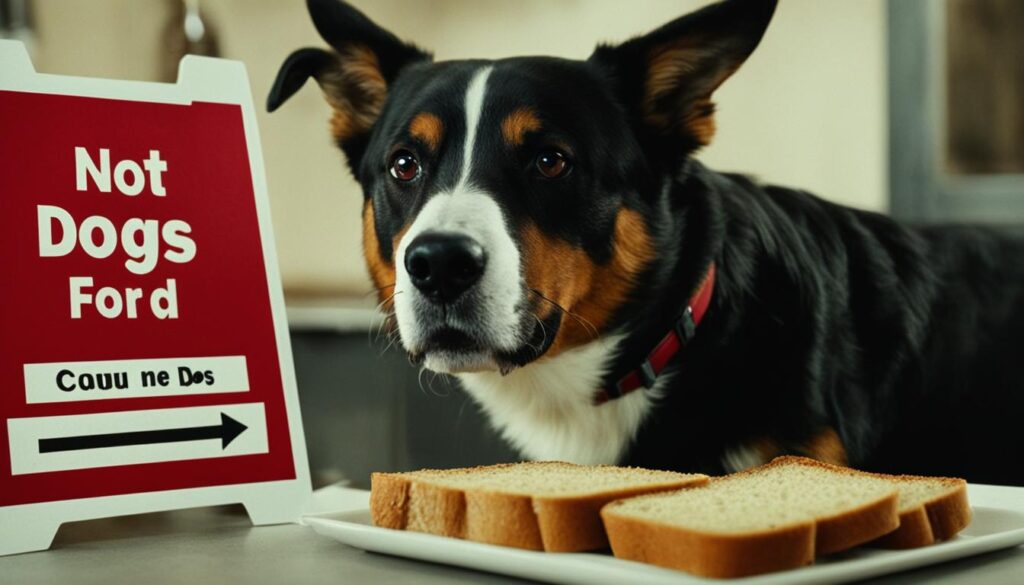
While bread crusts and seeded bread are not toxic to dogs, it is important to be aware of the potential risks associated with feeding these types of bread to your furry friend. Although dogs may enjoy the crusty edges of a loaf or the added texture of seeds in bread, it is crucial to prioritize their health and well-being. Let’s take a closer look at the specific risks involved:
Bread Crusts
Bread crusts may seem harmless, but they can actually pose digestive challenges for dogs. The tough and chewy texture of bread crusts can be difficult for dogs to digest, potentially leading to gastrointestinal discomfort and issues like diarrhea. To avoid these complications, it is best to refrain from feeding dogs bread crusts.
Seeded Bread
Seeded bread, although appealing to humans, can present risks for dogs. The seeds in bread can cause digestive problems and may even pose a choking hazard, especially for smaller breeds. To ensure the safety of your furry friend, it is recommended to limit the consumption of seeded bread or avoid it altogether.
Feeding your dog a well-balanced and nutritious diet is essential for their overall health and longevity. While bread can be a part of their occasional treats, it should not replace their regular meals or make up a significant portion of their diet. Instead, consider exploring bread alternatives that are specifically formulated for dogs, providing them with the nutrition they need while still offering a tasty indulgence. Always consult with your veterinarian for personalized advice on your dog’s dietary needs.
| Pros | Cons |
|---|---|
| Bread crusts and seeded bread are not toxic to dogs. | Bread crusts can be difficult for dogs to digest, leading to gastrointestinal issues. |
| – | Seeded bread may pose a choking hazard and cause digestive problems. |
| – | Dogs should not rely on bread as a significant part of their diet. |
Can Dogs Eat Toast and Bread with Butter?
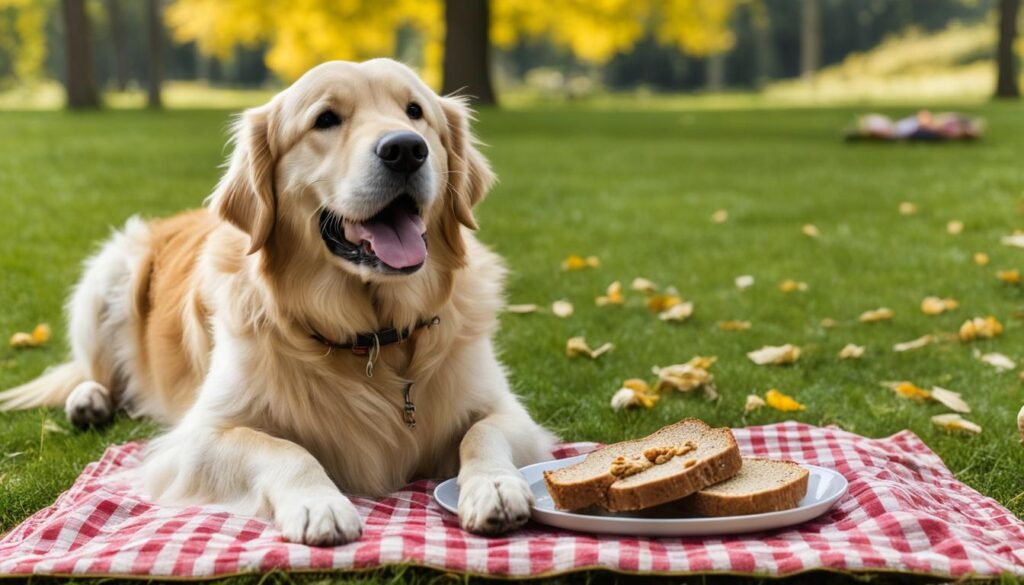
Dogs can enjoy plain toast as a snack without any added ingredients or toppings like butter. However, it’s important to be mindful of the amount of butter given to dogs. Butter is high in fat and can lead to digestive upset or weight gain if consumed in excess. As a responsible dog owner, it’s best to avoid giving dogs bread with butter and instead opt for plain bread as a healthier alternative.
I always make sure to serve my dog plain toast without butter. While a little bit of butter may seem harmless, it can contribute to unwanted weight gain and digestive issues. It’s better to prioritize my dog’s health and provide a simple and wholesome treat.
Plain toast can be a safe option for dogs as long as it’s given in moderation and doesn’t become a significant part of their diet. It’s important to remember that dogs have different dietary needs than humans, and not all human foods are suitable for them. While a small piece of plain toast can be a special treat for your furry friend, always prioritize their overall health and well-being by providing them with a balanced and nutritious diet that includes dog-friendly options.
Benefits of Plain Toast for Dogs
- Plain toast can serve as a simple and low-calorie snack for dogs.
- It can provide a tasty treat for dogs without any added sugars or artificial flavors.
- Plain toast can be easily digestible for dogs, making it a suitable option for dogs with sensitive stomachs.
Tips for Feeding Toast to Dogs
- Ensure the toast is plain and doesn’t contain any added ingredients that may be harmful to dogs, such as onions or garlic.
- Break the toast into small, bite-sized pieces to prevent choking hazards.
- Offer plain toast as an occasional treat and not as a substitute for a balanced and nutritious diet.
Can Dogs Eat Garlic Bread and Sourdough Bread?
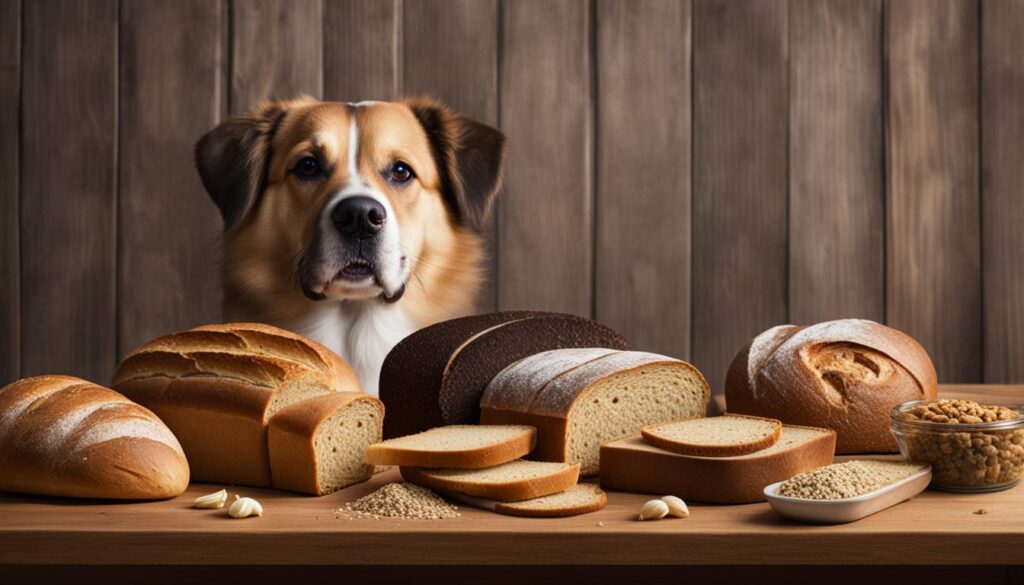
When it comes to feeding dogs bread, garlic bread should be avoided at all costs. Garlic is toxic to dogs and can cause damage to their red blood cells. While the garlic flavor may be enticing, it’s crucial to prioritize your dog’s safety and health. Instead, opt for bread varieties that are safe for dogs to consume.
Sourdough bread, on the other hand, is generally safe for dogs to eat in moderation. It doesn’t pose the same risk as garlic bread and can be a suitable option for occasional snacking. However, as with any bread, it’s important to check the ingredients to ensure they don’t contain any harmful substances like garlic or other spices that may be toxic to dogs.
Can Dogs Eat Banana Bread and Multigrain Bread?
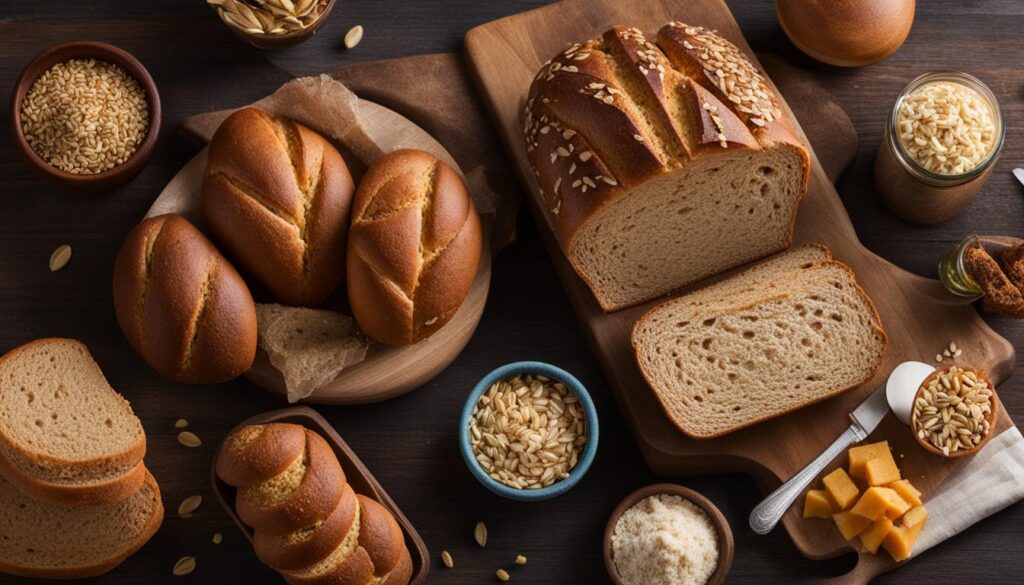
Dogs can enjoy plain banana bread as a treat, as long as it doesn’t contain any added ingredients like nuts or chocolate. Compared to other types of bread, banana bread can be a healthier option for dogs due to the nutritional benefits of bananas. However, it’s important to feed them plain banana bread in moderation, as excessive consumption of bread in general can lead to weight gain and digestive issues.
Multigrain bread is generally safe for dogs to eat, but it’s crucial to check the ingredients before offering it to your furry friend. Avoid varieties that contain harmful ingredients or are high in sugar or salt. Stick to plain multigrain bread without any added seeds or spices that may be problematic for dogs. As always, moderation is key when incorporating bread into your dog’s diet.
To summarize:
- Plain banana bread without nuts or chocolate can be a healthier option for dogs as an occasional treat.
- Multigrain bread is generally safe for dogs, but check the ingredients for any harmful additives.
- Feed bread to dogs in moderation to prevent weight gain and digestive issues.
Can Dogs Eat Pita Bread and Raisin Bread?
Dogs can enjoy plain pita bread as part of their diet without any added ingredients or toppings. Pita bread is generally safe for dogs to consume in moderation, as long as it does not contain harmful ingredients like onions or garlic. It can be a suitable alternative to other bread varieties for dogs.
However, it is crucial to note that raisin bread should never be given to dogs. Raisins are highly toxic to dogs and can lead to kidney failure and other serious health issues. Even small amounts of raisins can be dangerous for dogs, so it is important to keep raisin bread away from them at all times.
When selecting bread options for your dog, it is essential to be mindful of the ingredients and choose alternatives that are safe and healthy for them. Always read the labels carefully to ensure there are no harmful ingredients present in the bread.
| Pita Bread | Raisin Bread |
|---|---|
|
|
Can Dogs Eat Cornbread and Pumpernickel Bread?
When it comes to cornbread, dogs can enjoy plain cornbread without any added ingredients. However, it’s important to note that cornbread should not make up a significant portion of their diet. While corn itself is safe for dogs, cornbread often contains additional ingredients such as sugar or salt, which may not be ideal for their health. Feeding cornbread to dogs in moderation is key to avoiding digestive upset or weight gain.
On the other hand, pumpernickel bread is generally safe for dogs to eat. It’s a bread variety that is commonly made with rye flour and has a dark color and distinctive flavor. Pumpernickel bread contains natural ingredients and is typically free from harmful additives that could be detrimental to your dog’s health. However, it’s always important to read ingredient labels to ensure that there are no onions or garlic, as these ingredients can be toxic to dogs.
Remember that while cornbread and pumpernickel bread may be safe for dogs to consume, they should be offered in moderation as part of a balanced diet. And as with any new food, it is advisable to start with small portions and monitor your dog’s reaction to ensure they tolerate these bread varieties well.
Can Dogs Eat Cornbread?
Dogs can eat plain cornbread without any added ingredients, but it should not make up a significant portion of their diet.
Can Dogs Eat Pumpernickel Bread?
Pumpernickel bread is generally safe for dogs to eat, as long as it does not contain any harmful ingredients like onions or garlic.
Wrapping Up
In conclusion, while rye bread can be consumed by dogs in moderation, it should not be a significant part of their diet. Rye bread lacks the necessary nutrients to meet dogs’ nutritional requirements. When choosing bread for dogs, it is important to prioritize varieties that are safe and healthy for them.
Dogs have specific dietary needs, and it is crucial to provide them with balanced and complete meals that incorporate high-quality ingredients. Although bread can be given to dogs as an occasional treat, it should not replace their regular meals.
Instead of relying on bread as a source of nutrition, dog owners should focus on providing a well-rounded diet that includes protein, healthy fats, fruits, vegetables, and whole grains that are safe for canines. By considering their needs and making informed choices, we can ensure that our furry friends receive the nutrition they require for optimal health.
FAQ
Is rye bread safe for dogs?
Rye bread can be safely consumed by dogs in moderation, but it is not the healthiest snack due to its lack of nutrients and high sugar content.
Can dogs eat bread?
Yes, dogs can eat certain types of bread, but it should be given in moderation and as a treat rather than a staple in their diet.
What are the risks of feeding dogs rye bread?
Feeding dogs rye bread can pose risks such as potential digestive issues and liver damage if consumed in excess. It is important to be aware of the ingredients in rye bread and choose safe varieties.
What are some other types of bread that are safe for dogs?
Some bread varieties that are generally safe for dogs include plain white bread, whole wheat bread, and bread without any added ingredients like seeds, garlic, or raisins.
What are the risks of feeding dogs bread crusts and seeded bread?
Bread crusts can be difficult for dogs to digest and may cause gastrointestinal issues, while seeded bread may pose digestive problems or a choking hazard.
Can dogs eat toast and bread with butter?
Dogs can eat plain toast without any added ingredients or toppings like butter, but it is best to avoid giving dogs bread with butter as it is high in fat and may cause digestive upset or weight gain.
Is garlic bread safe for dogs?
No, garlic bread is not safe for dogs to consume as garlic can be toxic and cause damage to their red blood cells. Sourdough bread, however, is generally safe for dogs to eat in moderation.
Can dogs eat banana bread and multigrain bread?
Dogs can eat plain banana bread without any added ingredients like nuts or chocolate. Multigrain bread is generally safe for dogs to eat, but it is important to check the ingredients and avoid varieties that contain harmful ingredients or are high in sugar or salt.
Can dogs eat pita bread and raisin bread?
Dogs can eat plain pita bread without any added ingredients or toppings, but it is crucial to avoid giving them pita bread that contains harmful ingredients like onions or garlic. Raisin bread should never be given to dogs as raisins are toxic and can cause kidney failure.
Can dogs eat cornbread and pumpernickel bread?
Dogs can eat plain cornbread without any added ingredients, but it should not make up a significant portion of their diet. Pumpernickel bread is generally safe for dogs to eat, but it is important to avoid varieties that contain harmful ingredients like onions or garlic.


